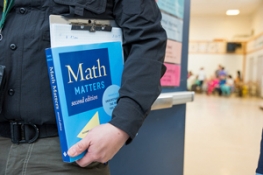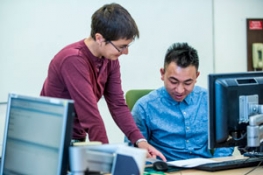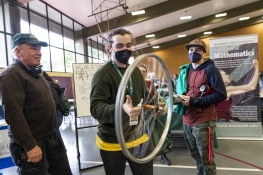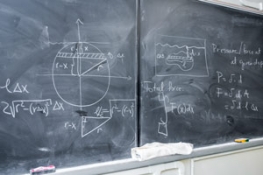FAQ
Frequently Asked Questions about the Cal Poly Humboldt Data Science Program
What is Data Science and why would I want to study it?
Broadly speaking, data scientists gather and investigate data and extract meaningful insights and hidden trends. They also use machine learning algorithms to build predictive models which have a wide range of applications from Tiktok recommendations to predicting the next COVID variant to surge. At Cal Poly Humboldt, we are particularly passionate about “Data for Good” and believe Data Science can help solve many challenges addressing our society from housing inequity to climate change.
Are Data Science jobs in demand?
Yes, Data Science is a rapidly growing field. In 2019, posting for data scientist positions on Indeed had risen by 256% compared to ten years prior and the US Bureau of Labor Statistics predicts data science will see more growth than any other field between now and 2029. Glassdoor ranked data scientist among the top three jobs in America, LinkedIn listed it as one of the most promising jobs of 2021. All in all, it is an exciting time to train in data science!
What are Data Scientists paid?
This really depends on experience and education level, geographic location, and the employer (a non-profit in the Midwest would generally pay less than a company like Google in the Silicon Valley). The median salary for an experienced data scientist in California is approaching $200,000, with an entry-level position at a lower rate. This recent article in Forbes has more information.
How is the Cal Poly Humboldt Data Science Program different from other educational programs in Data Science?
Ten years ago, there were effectively no degree programs in data science and data scientists were recruited from other quantitatively-oriented fields (like mathematics, physics, computer science). Today there are bachelor’s, masters and Ph.D. programs in data science. Our program at Cal Poly Humboldt was designed to help students master data cleaning and analysis, and to develop domain knowledge in an area of application (such as biology). We also highlight effective communication– a core skill of data scientists. We emphasize ethics and responsibility, and our guiding ethos is “Data for Good.” Classes and labs will include investigations into local and global challenges (e.g., sea level rise on the North Coast, fire resilience in California), in line with the polytech ethos “learn by doing.” This project-focused curriculum will allow students to develop a professional portfolio to share with future employers. Small class sizes create an opportunity for student-faculty interaction that is not possible in all programs.
What is the “Area of Application?”
This is an advisor-approved set of cohesive courses in a discipline outside of Data Science. For example, students who wish to use data science to tackle a diverse set of biological questions in areas ranging from medicine to genomics to evolution would select Biological Sciences as an area of application and take the approved courses in that discipline. These areas are not limited to the sciences. For example, students interested in careers which critically analyze crime patterns, access to justice, policy, or advocacy would select “Justice” as an area of application. We are currently developing these areas of application collaboratively with other departments and will have more information available later this year. For students who would like a more theoretical grounding in data science, we recommend choosing “Mathematics” as an area of application.
How is this degree different from a computer science degree at Cal Poly Humboldt? Or a math degree?
Data science really lies at the intersection of math, statistics and computer science. You can look at specific major requirements for math and computer science and compare them to the courses for the Data Science degree. The Data Science program also asks students to take 15 units in an area of application (such as wildlife, as illustrated below) and students will hone communication skills. It is truly an interdisciplinary program.
This figure shows the courses which make up the major.
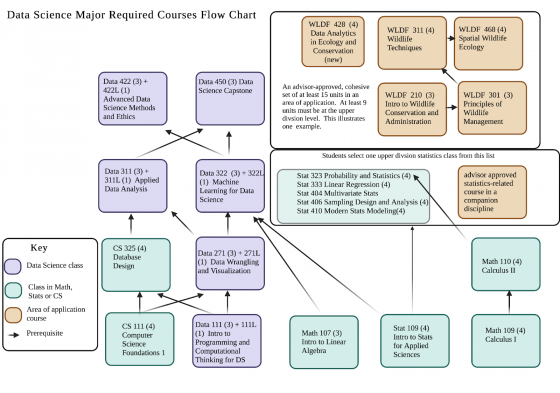
I have never coded before. Is that a prerequisite?
No, our major path teaches coding in the first classes.
Who works in data science on campus?
As mentioned above, data science is very interdisciplinary, and many faculty are using data science techniques in their own research. The major is in the Department of Mathematics.
I’ve read about the Place-Based Learning Communities at Cal Poly Humboldt. Do Data Science majors have a PBLC?
Yes, Data Science majors will join Math, CS and Software Engineering majors in the Representing Realities cohort.
What will students do in the Capstone class?
This class is a culminating experience for majors, and will involve a semester-long team research project. This course will also involve professional and job-skill development activities to prepare students for life beyond Humboldt, including graduate school attendance, working as a data scientist or pursuing another quantitative career. The course will be writing-intensive.
Do you accept transfer students?
Absolutely!
Can students double major in Data Science and something else?
In principle, yes. Cal Poly Humboldt has a policy on second majors including unit caps, and paperwork to submit for approval.
What are the laptop and other technology requirements?
Data science courses will be taught using laptops. This allows us to do a number of activities in class, live coding demonstrations, and for you to work on projects with instructor assistance. If you purchase a laptop prior to arriving, we recommend the following specs: at least 8 Gb of RAM and 20Gb of free hard drive space, administrative access and the ability to connect to the internet. Our program will have a number of laptops available for loan for students majoring in data science. If more data science majors want to borrow laptops than we have, students with financial need will be prioritized. Our campus bookstore offers laptops which meet the recommended specs. The library also has a device loaning program.




